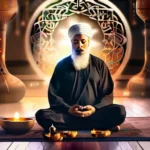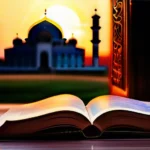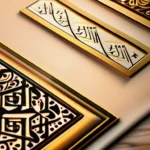Explore the fundamental beliefs, practices, and history of Islam in this detailed guide.
Islam is a monotheistic religion that originated in the Arabian Peninsula over 1400 years ago. Founded by Prophet Muhammad (PBUH), it has grown to become one of the world’s largest religions with millions of followers worldwide. In this article, we will delve into the core beliefs, practices, history, and key figures of Islam.
The Pillars of Islam
Imagine building a house; you need strong pillars to hold it up. Similarly, for those who follow Islam, there are five fundamental practices known as the Pillars of Islam. These are like the foundational stones that provide stability and direction in their spiritual journey. Have you ever wondered what these pillars entail?
The first pillar is the declaration of faith or Shahada, a statement that declares there is no god but Allah, and Muhammad is His messenger. This is akin to planting a seed; it’s the very foundation upon which all else builds. How many times have you recited this powerful phrase?
The second pillar is prayer or Salat. Just as regular tilling of soil keeps a garden flourishing, prayers keep the soul healthy and strong. It involves five daily prayers, each timed with specific moments in the day. Could you ever imagine your life without these routine reminders to connect with Allah?
The third pillar is Zakat, the practice of giving alms. This is like sharing a bounty with others; it not only benefits the recipient but also purifies the giver’s wealth and spirit. How often do you think about how your money could be used to support those in need?
The fourth pillar is fasting during Ramadan, known as Sawm. Fasting from dawn until sunset is like taking a spiritual detox; it cleanses not only the body but also the soul. Have you ever embarked on such a challenge? It’s a profound experience of self-restraint and reflection.
The fifth pillar is pilgrimage or Hajj, which requires every able-bodied Muslim to make a pilgrimage to Mecca at least once in their lifetime. This journey, rich with symbolism and spiritual significance, is like walking the path walked by thousands of years of believers. Do you dream of making this sacred journey?
The Pillars of Islam are not just rituals; they are living practices that connect us with our faith. Each one offers a unique window into the heart of Islam, guiding us to live in accordance with Allah’s will.
Islamic Beliefs: Tawhid and the Five Pillars
Imagine Islam as a vast ocean, where the concept of Tawhid serves as its most profound current. Tawhid means the belief in the oneness and indivisibility of God. It’s not just about acknowledging that there is only one God but understanding the depth and breadth of His unity.
Think of it this way: if you see a beautiful sunset, do you attribute it to the sun alone or do you recognize that countless elements in nature contribute to its splendor? Similarly, Tawhid teaches us to see the world as a manifestation of God’s creation, where everything points towards His oneness.
The Five Pillars of Islam are like the navigational tools for this vast ocean. But without Tawhid, these pillars would be lost at sea. Each pillar is rooted in the belief that there is no god but Allah and that Muhammad (PBUH) is His messenger. Let’s explore how Tawhid shapes each of these pillars:
- Shahada: The declaration of faith, “There is no god but Allah, and Muhammad is the Messenger of Allah.” This statement encapsulates the essence of Tawhid by asserting God’s oneness.
- Salat (Prayer): Performing prayers five times a day reminds Muslims of their submission to God’s will. Each prayer session can be seen as a reaffirmation of the belief in His oneness and omnipotence.
- Zakat (Charity): Giving alms not only helps those in need but also purifies one’s wealth, reflecting a commitment to the divine order where God is the ultimate owner of all bounty.
Tawhid underpins every act of worship and daily life. It’s the foundation upon which Muslims build their faith and practice. Just as a building needs a solid base to stand tall, Islam requires Tawhid for its strength and integrity.
The Life of Prophet Muhammad (PBUH)
The life of Prophet Muhammad (PBUH) is like a beacon of light, guiding humanity through the darkest corners of ignorance and despair. Born in 570 CE in Mecca, Arabia, his journey was one of transformation from a young man involved in trade to becoming a revered messenger of God.
Was he merely a simple merchant or did he have a deeper purpose? The early life of Muhammad (PBUH) is marked by questions. He spent much of his youth as a caravan trader, traveling the desert routes between Mecca and other cities. Yet, there was something more profound in him that set him apart.
One fateful night, while meditating in a cave on Mount Hira, Muhammad (PBUH) experienced what is described as the first revelation from Allah. Could this be the moment when destiny chose its champion? This event marked the beginning of his mission to spread the message of monotheism and righteousness.
The early years of Islam were fraught with challenges. Muhammad (PBUH) faced opposition, persecution, and even exile from Mecca. Yet, he persevered, gathering a small yet growing community of followers who believed in him as the Seal of the Prophets. The pivotal moment came when he migrated to Medina, known today as Madinah. This migration, or Hijra,, is celebrated annually by Muslims during Ramadan.
The establishment of Islam in Medina was not just a political move; it was a revolution. Here, Muhammad (PBUH) established the first Muslim community based on principles of equality and justice. The Constitution of Medina became a foundational document for social order, ensuring that every individual’s rights were respected.
Was Muhammad (PBUH) just another prophet or was he a transformative figure? His life story is a testament to the power of conviction and the ability to inspire change. Through his teachings, Islam spread far beyond its Arabian roots, touching lives around the globe with messages of peace, compassion, and submission to the will of God.
The life of Prophet Muhammad (PBUH) is a profound narrative of faith, struggle, and triumph. It sets a moral compass for Muslims worldwide, guiding them in their personal and communal lives with principles that continue to resonate through time.
Islamic Practices: Prayer, Fasting, and Charity
Imagine a day in the life of any devout Muslim, starting from the moment they wake up. The first dua (supplication) is directed towards Allah as the sun rises, setting the tone for a spiritual day ahead. But what exactly does this daily routine entail? It’s not just about ritualistic actions; it’s about deepening one’s connection with the divine and adhering to Islamic practices.
Prayer, or Salat, is the cornerstone of a Muslim’s faith. It’s like a regular check-in with the cosmos, reminding believers that their lives are not separate from the grand design. Imagine each prayer as a dawa (call) to remember and return to God. There are five obligatory prayers throughout the day—Fajr at dawn, Dhuhr at midday, Asr in the afternoon, Maghrib when the sun sets, and Isha after darkness falls. Each prayer is a time for reflection, humility, and gratitude.
Fasting during Ramadan takes on a whole new dimension of personal discipline and community support. It’s like taking a spiritual cleanse where one abstains from food, drink, and other earthly pleasures from dawn until sunset. But it’s not just about physical abstinence; it’s also about self-control, patience, and empathy for those less fortunate. Muslims fast to purify their souls, seek forgiveness, and strengthen their resolve in the face of temptation.
Charity, or Zakat, is another pillar that requires believers to give a portion of their wealth to those in need. It’s not just about financial giving; it’s an act of love and compassion, a way of ensuring that wealth circulates among the community. Imagine Zakat as a river that nourishes everyone along its path, creating a sense of interconnectedness and mutual support. By giving Zakat, one cleanses their heart from greed and selfishness, making room for generosity and kindness.
These practices are not just external actions; they transform the soul with every recitation, every sip of water during fasting, and every act of charity. They serve as a reminder that being a Muslim is about living in harmony with divine commandments, fostering a deep spiritual life that extends beyond the individual to the community at large.
Through prayer, fasting, and charity, Muslims strive to create a world where faith and humanity are intertwined. These practices not only shape their daily lives but also build a society grounded in compassion, justice, and sincerity. As they adhere to these Islamic practices, they find strength, guidance, and purpose in their faith.
The Quran and Hadith
The Quran, often referred to as al-Kuran, holds a sacred and pivotal place in Islam. It’s like a lighthouse guiding ships through treacherous seas; without it, the spiritual journey might be lost. How does one begin to grasp this monumental text? Imagine opening a book that contains not just words, but the very essence of guidance for life itself. The Quran is more than just a collection of verses; it’s the direct word of Allah as revealed to the Prophet Muhammad through the angel Gabriel.
But what exactly do these verses contain? They speak of faith, morality, and ethics—teaching believers how to live a righteous life. Each chapter, or sura, delves into different aspects of Islamic belief and practice. For example, Surah Al-Fatiha introduces the foundational elements of prayer and worship, while Surah Al-Imran discusses the history of prophets and their roles in guiding humanity.
Alongside the Quran are the hadith, narratives that detail the actions and sayings of the Prophet Muhammad. These stories provide context to the verses in the Quran, much like a map guides travelers through unfamiliar territory. Hadiths offer practical advice on everything from business ethics to personal conduct. Together, these two sources form the bedrock of Islamic law and morality.
How does one reconcile these texts? It’s akin to following a recipe. The Quran provides the basic ingredients—faith, prayer, charity—and the hadiths are like the detailed steps that ensure everything comes together perfectly. Just as a chef needs both the cookbook and the technique to make a dish, a Muslim must understand both the Quran and hadith for a complete understanding of their faith.
So, why is this combination so crucial? Because it provides a comprehensive framework for living an Islamic life. It’s not just about reciting verses; it’s about applying those teachings in every aspect of one’s daily existence. This dual guidance ensures that Muslims have a clear path to follow, ensuring their actions align with divine will.
Islamic History: The Spread of Islam and Major Events
What is Islam? A Comprehensive Guide to the Islamic Faith
Islamic History: The Spread of Islam and Major Events
The tale of Islam’s journey from its humble beginnings in Mecca to becoming one of the world’s largest religions is a story of faith, struggle, and resilience. How did this religion that started with just a few followers grow into a global community? Let’s delve into the key events and figures that shaped the history of Islam.
The life of Prophet Muhammad (peace be upon him) marked the beginning of this journey. Born in 570 CE, he was initially faced with skepticism and opposition from his own people. It wasn’t until he received his first revelation at the age of 40 that his message began to take root. Imagine a solitary figure standing against a sea of disbelief—this is what Islam’s early days looked like.
One of the most pivotal moments in Islamic history came with the Hijra, or migration from Mecca to Medina in 622 CE. This event not only saved the Prophet but also laid the foundation for the Islamic community or ummah. Think of this as a beacon of hope amidst adversity—a light that began to shine brightly despite the darkness around it.
The rise of Islam continued under the guidance and leadership of the Rashidun Caliphs, who succeeded Prophet Muhammad. They established the first Islamic state with principles based on justice, fairness, and equality. This was a time when Islam spread not just through force but also through the hearts and minds of people, much like a gentle stream that gradually carves its path through stone.
The Umayyad and Abbasid Caliphates followed, each expanding the Islamic empire’s borders while strengthening its cultural, economic, and religious influence. The golden age of Islam saw advancements in science, medicine, architecture, and philosophy, enriching not just Muslim societies but also those of Europe and beyond.
Throughout history, Islam faced numerous challenges—ranging from invasions to internal strife. Yet, it continued to evolve, adapting to new environments while preserving its core beliefs and practices. Today, as we look back at this remarkable journey, one can’t help but be struck by the resilience of a faith that has stood the test of time.
So, where does Islam go from here? Will it continue to adapt and grow, or face new challenges in an ever-changing world? The future is uncertain, yet the past teaches us that with faith and unity, anything is possible. As we explore further into what Islam means today, let’s reflect on its rich history and the lessons it has imparted along the way.
Conclusion
 Islam is a rich and diverse faith that continues to evolve and adapt to the changing times. By understanding its fundamental principles and practices, one can gain a deeper appreciation for its beauty and complexity.
Islam is a rich and diverse faith that continues to evolve and adapt to the changing times. By understanding its fundamental principles and practices, one can gain a deeper appreciation for its beauty and complexity.











